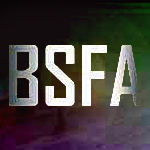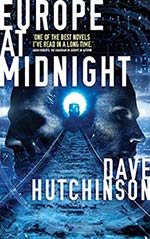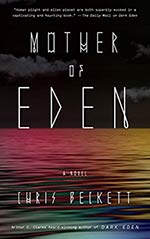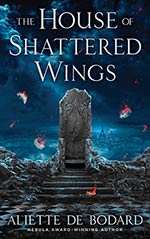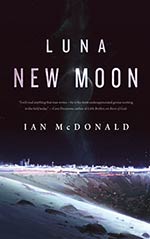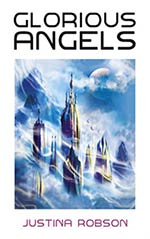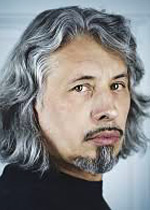2015 BSFA Shortlist
The British Science Fiction Association has announced the shortlist for the 2015 BSFA Awards.
Best Novel:
- Europe at Midnight by Dave Hutchinson (Solaris)
- Mother of Eden by Chris Beckett (Corvus)
- The House of Shattered Wings by Aliette de Bodard (Gollancz)
- Luna: New Moon by Ian McDonald (Gollancz)
- Glorious Angels by Justina Robson (Gollancz)
See the press release for the complete shortlists in all categories. The winners will be announced the evening of Saturday, March 26th during Mancunicon, the 67th British National Science Fiction Convention, otherwise known as Eastercon.
So what do you think of this list? Gollancz seems to be hitting on all cylinders.
Vendetta by Gail Z. Martin
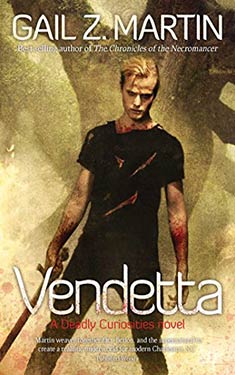 Vendetta is Gail Z. Martin’s follow-up to Deadly Curiosities. Written December of 2015 and published by Solaris, it is the second book in the “Deadly Curiosities” urban fantasy series set in modern day Charleston, South Carolina. This series just keeps getting better. Many of the complaints I had when reading the first novel, which I loved, have been rectified in this second book in this new promising series.
Vendetta is Gail Z. Martin’s follow-up to Deadly Curiosities. Written December of 2015 and published by Solaris, it is the second book in the “Deadly Curiosities” urban fantasy series set in modern day Charleston, South Carolina. This series just keeps getting better. Many of the complaints I had when reading the first novel, which I loved, have been rectified in this second book in this new promising series.
The ghosts in Charleston are getting very riled up, manifesting in more and more violent manners, and it is up to Cassidy Kincaide and gang to figure out why and solve the problem before someone gets hurt. In addition, people are disappearing across the city while walking down stairs. That’s right they just disappear mid-stride.
As in the first book, Vendetta is filled with action. Starting from page one, there are ghostly battles filling every one of its 459 pages. Cassidy is getting more proficient in controlling her powers and this makes for tighter plotting throughout this novel. I did not have to wonder if the reader was going to be treated to yet another “Cassidy collapse” each time she walks into a new room.
Charleston the city is definitely more of a character in this second novel, specifically the “Angel Oak” on Johns Island. I looked this up and it is a real tree. The author is doing a fine job of making me curious to learn more about Charleston. This had been one of my gripes about the last book, I thought Ms. Martin should have written more about the city itself, and I think she vastly improved upon this with this second book.
I was also relieved to see that the characters were making fewer nonsensical moves in this book, or they were still making them but admitted that they were bad ideas. I’m OK with making dumb moves when the characters feel they have no choice, and acknowledge that the move is not the smart one. In this case, because time was becoming an issue and the evil at work in Charleston was so powerful Cassidy and friends needed to pull out all the big guns including Sorren, who had a much larger part in this book than the last.
So my new complaint about this book, and it is a small one, is that the true nature of Cassidy and Sorren’s shop, Trifles and Folly, is supposed to be a secret, but by the time this book ends it is apparent that it is the worst kept secret in the history of secret keeping! Everyone who has ever been introduced in either of the books apparently already knew all about it.
I’m giving Vendetta 4 enthusiastic stars. There is so much potential in this series. I hope the author introduces a multi-book plot in the next one, to keep the series from becoming too formulaic. Maybe more about “The Family” and “The Alliance” the two secret organizations only briefly mentioned in the books so far.
Note: This novel was given to the reviewer by the publisher for a fair and honest review.
New Publications: The Blizzard by Vladimir Sorokin
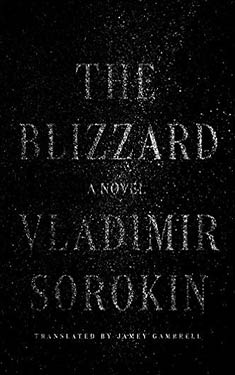 Whenever I review of a foreign language work of speculative fiction, I find myself including a statement reflecting my certainty that readers of the work in its original language – Russian, Spanish, Estonian, whatever – have a fuller experience of its subtleties, humor, and imagery than I. That statement usually comes towards the end of the review, but with Vladimir Sorokin’s The Blizzard, I have decided to put it up front. I feel certain that his Russian readers have a – well, as I said.
Whenever I review of a foreign language work of speculative fiction, I find myself including a statement reflecting my certainty that readers of the work in its original language – Russian, Spanish, Estonian, whatever – have a fuller experience of its subtleties, humor, and imagery than I. That statement usually comes towards the end of the review, but with Vladimir Sorokin’s The Blizzard, I have decided to put it up front. I feel certain that his Russian readers have a – well, as I said.
It helps to learn that Russian readers, by the time they reach adulthood, have received a steady diet of “lost in the snow” narratives. The motif appears in fiction, verse, and folklore, and the stories almost always end poorly for their protagonists. The Blizzard opens with Dr. Garin, who is desperate to find transportation for himself and his serum to the plague-struck village of Delgoye, learning that snow has shut down the railway. It’s a set-up that will prompt Russian readers to think, “Here we go again.”
The forested, rural setting seems nineteenth century, and the frantic Dr. Garin, with his pince-nez and mustache, steps out of a Chekov story. That atmosphere continues when Dr. Garin learns that Crouper, the peasant who handles local bread deliveries, may have horses and a sleigh available. He approaches the man, who does indeed have horses. He has fifty of them. This is a reasonable number, since they are the size of partridges, and they propel his sleigh by running inside a drum. The doctor convinces Crouper to undertake the journey, which in normal circumstances would take only a few hours. The village will be saved from what we learn about this time is an outbreak of zombies caused by a virus brought back from Colombia. The dead are tunneling through the village, breaking into homes, and infecting the living. Dr. Garin does not approve of foreign travel.
Sorokin is one of the most popular contemporary novelists in Russia. His work employs fantastic elements in narratives that range from traditional science fiction to the sort of weird environment he builds in The Blizzard. It is never clear if he has set this tale in an alternate nineteenth century or some future that has devolved into a combination of new technology crippled by a collapsed infrastructure. (Thanks to another review, I learned that there are internal clues that place the story in our own present day.) One development running throughout the story is the twin phenomena of biological miniaturization and gigantism. Crouper’s tiny horses are distantly related to horses the size of small apartment blocks. These are used to haul trains that no longer have a power source. On their journey, Garin and Crouper take refuge in the home of a miller the size of a samovar. Garin has a sexual encounter with his full-sized and delectable wife. One of the men’s many road accidents occurs when a runner of their sleigh crashes into and breaks off in the nostril of a dead giant.
The details of all this are enjoyable and expertly drawn, even if their import remains vague. Dr. Garin becomes increasingly unsympathetic, his humanitarian zeal a cover for his temper, condescension, and poor impulse control. My sympathies all went to Crouper and his tender concern for his hard-working horses. You don’t have to be Russian to guess that this trip into the snow will end badly. But again I find myself wondering if a Russian reader finds all this more than a mildly entertaining curiosity.
LeGuin Documentary Starts Kickstarter Campaign
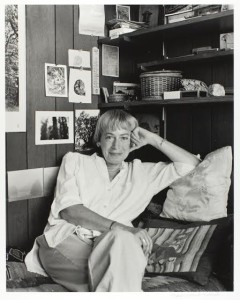 Documentary filmmaker Arwen Curry has worked seven years assembling footage for Worlds of Ursula K. LeGuin. Curry has produced significant documentaries on Susan Sontag and the California architect and designer Charles Eames, but this is her most personal project. She grew up immersed in LeGuin’s fiction, and for this film she has traveled with the author to the many landscapes that inspired her fantastic worlds. Along the way she learned just “how deeply Le Guin’s otherworldly made-up places are informed by real places in the real world. She’s a very rooted writer, and person.”
Documentary filmmaker Arwen Curry has worked seven years assembling footage for Worlds of Ursula K. LeGuin. Curry has produced significant documentaries on Susan Sontag and the California architect and designer Charles Eames, but this is her most personal project. She grew up immersed in LeGuin’s fiction, and for this film she has traveled with the author to the many landscapes that inspired her fantastic worlds. Along the way she learned just “how deeply Le Guin’s otherworldly made-up places are informed by real places in the real world. She’s a very rooted writer, and person.”
This film gives us a chance to hear the LeGuin’s voice recounting her “journey of self-discovery as she comes into her own as a major feminist author, inspiring generations of women and other marginalized writers along the way.” Curry also brings in commentary by such figures as Margaret Atwood, Samuel R. Delany, and Karen Joy Fowler.
The National Endowment for the Humanities awarded Worlds of Ursula K. LeGuin a production grant, but those funds will not be released until the filmmakers raise a remaining $80,000. A Kickstarter campaign began on Februrary 1 and runs through the end of the month. It’s a chance to participate in a project that will help define the central role science fiction and speculative literature plays in American society.
Use this link to access the Kickstarter campaign.
https://www.kickstarter.com/projects/arwencurry/worlds-of-ursula-k-le-guin
James Tiptree, Jr. Literary Award on WWEnd!
An award encouraging the exploration & expansion of gender.
After many delays we have finally managed to get the James Tiptree, Jr. Literary Award added to the WWEnd database! The biggest hurdle was to update the site to accept short fiction — where before we only had full length books — because the Tiptree is a mix of novels and short fiction in the same award. After that came a lot of data entry to get all the books, especially the new short fiction, and dozens of new authors into the site — a task taken up by our Uber User members so three cheers for them!
This is the last of the big genre awards for us to cover but certainly not the least. If you’re not familiar with the Tiptree Award here are the basics straight from the official site:
In February of 1991 at WisCon (the world’s only feminist-oriented science fiction convention), award-winning SF author Pat Murphy announced the creation of the James Tiptree, Jr. Literary Award, an annual literary prize for science fiction or fantasy that expands or explores our understanding of gender. Pat created the award in collaboration with author Karen Joy Fowler. The aim of the award is not to look for work that falls into some narrow definition of political correctness, but rather to seek out work that is thought-provoking, imaginative, and perhaps even infuriating. The Tiptree Award is intended to reward those writers and other creative artists who are bold enough to contemplate shifts and changes in gender roles, a fundamental aspect of any society.
We’re very excited to bring such a great and diverse award to Worlds Without End and we hope you’ll take a look and find some great genre fiction to add to your reading pile!



















 Full Details
Full Details
